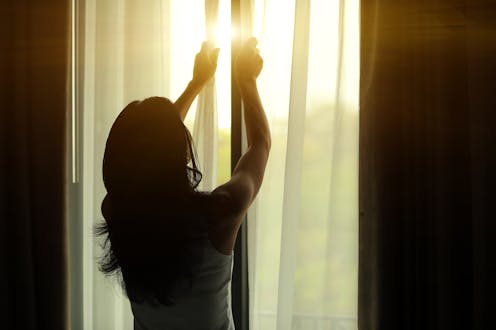Bushfires in Victoria: how to protect yourself if the air is smoky where you live
- Written by Ryan Mead-Hunter, Senior lecturer, School of Population Health, Curtin University

Bushfires broke out yesterday in western Victoria during a day of extreme weather conditions across the state. Although authorities have reported the situation is easing, emergency services continue to fight blazes in the Grampians National Park around the towns of Bellfield and Pomonal.
While the air quality in Australia is generally good, events such as bushfires can have a significant effect. Smoke can travel long distances and reduce air quality throughout a city or region.
The combustion of vegetation produces a range of gases, including carbon monoxide, as well as fine particles, often described as PM2.5 (particles of 2.5 micrometres in diameter or less). These particles can remain suspended in the air for extended periods and, owing to their tiny size, can penetrate deep into the lungs when inhaled.
Exposure to PM2.5 in bushfire smoke can result in a range of symptoms including coughing, throat irritation, as well as irritation to the eyes and nose. It can make existing conditions such as asthma worse and increase hospital presentations.
The longer-term health effects of PM2.5 exposure are well established, with research by the World Health Organization and the US Environmental Protection Agency linking PM2.5 exposure to respiratory and heart disease.
Ultimately, poor air quality can affect all of us, with even healthy people experiencing symptoms when exposed to high concentrations of bushfire smoke. There are, however, things we can do to protect ourselves.
Read more: 3 ways to prepare for bushfire season if you have asthma or another lung condition
Monitor the air quality
Air quality indexes are based on measurements of PM2.5 and other pollutants. On air quality indexes lower numbers indicate higher air quality, and vice versa. A number of websites provide air quality index information, for example IQAir for locations around Australia, or World’s Air Pollution for locations globally.
There are also apps such as AirRater which can provide useful information in addition to air quality values, such as pollen levels.
Although a number is much more informative from a research point of view, these sorts of services also provide air quality ratings such as “poor, "fair” or “good”, which can be helpful for people who may be unfamiliar with what the numbers mean.
Notably, these sources indicate the air quality around Victoria remains good at present.
When looking at air quality index values or PM2.5 concentrations, it’s important to note these do not identify the sources of the particles, so not everything counted as PM2.5 on even a smoky day is necessarily bushfire smoke. But PM2.5 values are a good indicator of overall air quality.
A growing number of air quality monitors are available to buy for home use, which measure single pollutants or a number of pollutants.
However, these instruments are not the same as those used in statutory air quality monitoring stations (which provide data for websites like those mentioned above). Statutory stations are set up by regulators or government agencies and use instruments that must meet national or international standards.
In many cases the accuracy of low-cost devices may not be well established. And effective calibration – where the measurements are verified using an alternative method, as would happen in a statutory monitoring station – might not be possible, particularly by end users.
Stay inside
When the air is noticeably smoky, or the air quality index is high, it’s best to remain indoors with doors and windows closed if you can.
The threshold at which you make this decision may depend on your personal circumstances. For example, healthy people can generally continue outdoor activities when the air quality is “fair”. However, someone with a respiratory condition might need to decrease or stop outdoor activities at this point. If the air quality is “very poor”, everyone should stay indoors.
If you have a particularly leaky home – say if you notice a draft, or odours from outside when the doors and windows are shut – then smoke ingress may be an issue. In this case, you may like to go elsewhere (for example, a friend’s house, or a public building with filtered air), provided it’s safe to do so.
Read more: Queensland's fires are not easing at night. That's a bad sign for the summer ahead
A high-powered air cleaner or purifier with a HEPA (high efficiency particulate air) filter may also offer some benefit, especially for people with respiratory conditions.
If you get one of these, remember placement is important. Portable units may work for a single room, but not a whole house. Consider the best location for these devices (probably the room where you spend the most time).
Ultimately only the air which passes through the filter will be treated, so the size of the unit must be appropriate for the space. The Victorian government offers some advice on how to ascertain what sort of unit will be suitable for your space.
When staying indoors it’s safe to use air conditioners, provided they recirculate the air already in the house (and the windows and doors are closed). Reverse-cycle air conditioners are a good option if you have them. Any system which draws in outside air without treatment should be avoided.
Wear a mask if going outside
If you need to go out when the air quality is poor, a P2 (or N95) mask provides protection from smoke particles in the air (but not gases such as carbon monoxide). For effective protection, the mask should be fitted properly and worn for the duration of your time outdoors.
Respirator masks may not be a good option for those with existing health conditions such as chronic obstructive pulmonary disease, so in these cases people should seek medical advice.
Authors: Ryan Mead-Hunter, Senior lecturer, School of Population Health, Curtin University




